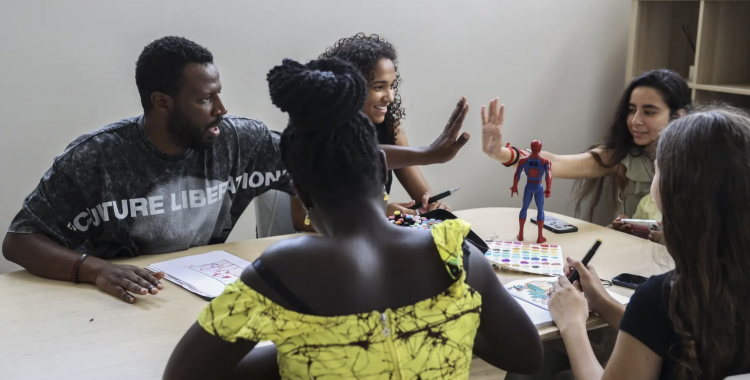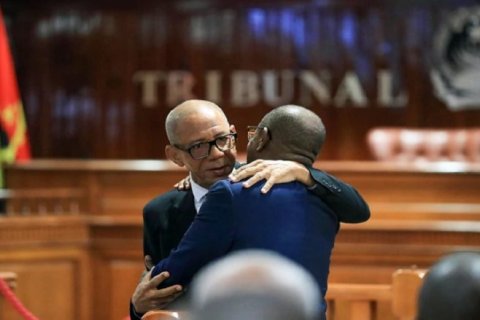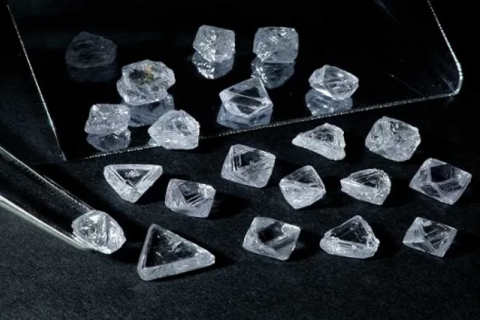Mundu Nôbu was created to help young people from underrepresented communities reach their full potential. Around one hundred of the 500 who signed up have been in this dream factory for a year, where they also help overcome nightmares such as racism and discrimination.
Musician and composer Dino D'Santiago is the president of the association, which he founded with Liliana Valpaços, and in an interview with the Lusa news agency, he acknowledges that it is more about what he learns than what he teaches, although he knows how important it is as an inspiration and proof that even those who come from a disadvantaged background can go far, albeit more slowly.
The artist gets excited when talking about these young people who often come from places "where even dreaming is a privilege", but who in this Mundu Nôbu realize that, "more than being able to dream, they have many tools and many people around them who thrive with them and who, subjectively, work on each dream".
"One wants to pursue journalism, and we can get an internship; another wants to pursue diplomacy and, after a while, she's already talking about diplomacy with the president of the Republic, who encourages her," he says.
In this space, there are young people who like poetry and who found a creative writing workshop there. Many of them left the country for the first time and one of them represented Portugal in Osaka, at the largest expo in the world, with a poem he wrote.
And there's Abigail, 19, who has always loved art and has already managed to exhibit some of her work at FNAC.
He tells Lusa that the association has given him contact with "different people, different nationalities, different realities."
"This opens my mind to be able to have more inspiration and not only that, but also to be able to do what I like most, which is drawing," he says.
Raquel is 18 years old, wants to study journalism and believes that Mundu Nôbu has already helped her achieve this dream, emphasizing that what the association offers adds to her life what she was missing.
Leonor, 16 years old, identified a big difference in the association's objectives compared to all the others. In addition to dreaming of being a ballerina, she draws and would like to have an architecture firm.
About Dino D'Santiago, she says that he makes her believe in her dreams. "He shows me that, regardless of my reality, we can achieve our dreams."
Diana, 17, also highlights the "good results" since she decided to "throw herself in" and sign up for this new world. Of the many guests who have been to the association – businesspeople of Portuguese origin, artists, athletes, singers – the young woman particularly remembers the actress Rita Pereira. "She showed her will and left me and other young people with the desire to believe."
For Dino D´Santiago, the dreams of these young people have been realized "at lightning speed", which has been helped by small, big investments, such as the location of the association in an upscale area of Lisbon and not in the neighborhoods where they live.
The author of songs such as "Nova Lisboa" and "Crioula" warns about the difficulties faced by these young people, who come from peripheral neighborhoods and, for the most part, from very dysfunctional and precarious families.
"In our housing complexes, we still have houses without electricity, we still have houses without water, we still have children who go to school hungry because there is no water, we still have children whose greatest enemies are their siblings who fight over what little there is in the refrigerator".
At Mundu Nôbu, the technicians who accompany these young people are available 24 hours a day, in addition to a psychologist. They share joys and sorrows, especially because there are visceral issues, such as racism.
"All these children share the horrible things they experience in their homes," he said, praising their ability to believe in the future, like Edgar, who recently lost his mother and whose father lives in Angola. He has very little money each month, lives alone, studies and wants to graduate in politics.
Edgar Domingos was the big winner of the literary contest that took a young man from this association to represent Portugal at Expo Osaka, in Japan. He could not go because he is in the process of legalization. It was Francisco Vieira who captivated the audience with a poem that asks and answers: "And next, Portugal? It's about making it happen!".
The artist highlights the importance of relationships between young people. "Of the whole project, what they like most is the moments of sharing."
"The fact that they feel heard makes them feel, in absolute silence, while each one speaks, more and more that this is a home where they can free themselves from their vulnerability," he says.
And there is no shortage of difficult topics, such as the triple homicide in Bairro do Vale, in Lisbon, in which a barber, the father of one of the young people from Mundu Nôbu, was killed.
But also the death of Odair Moniz, in Cova da Moura, and the bodies of Asian immigrants stopped by the police on Rua do Benformoso, episodes that left a deep impression on them and on which technicians and a psychologist had to work.
The young people respond to the controversies involving immigrants and nationalism: "I will prove my worth, I will prove that I am above the color that you see and think is inferior to the one you have at the moment", says the musician.
Ângela Almeida, the association's social monitor, says that she looks back at everything that failed her and was lacking in order to find what to give to these young people.
She positively highlights the interpersonal contact of the young people and sees in them "a very bright future, completely different from the one they themselves brought".
"I believe that these young people, whose minds are already being changed, will also want to change the minds of other young people", he says.
José Vaz, another of the monitors, says that he was surprised by the young people's ability to adapt.
"What we pass on to the young people is confidence", he says, adding that the mission is accomplished when they believe in what they are capable of, which is a lot.







